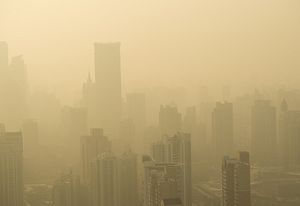The Standing Committee of the National People’s Congress approved revisions to China’s Environmental Protection Law (EPL) this week, paving the way for higher fines to deter polluters. The revisions marked the first change to China’s environmental protection legislation since 1989, when the EPL first took effect. According to Xinhua, the revisions call for improved monitoring of both the environment and health; improved survey and risk assessment mechanisms; and more severe punishments for polluting. The new law will go into effect on January 1, 2015.
Perhaps the single most important change is that the cap on environmental fines has been removed, meaning China’s Ministry of Environmental Protection (MEP) will finally be able to implement fines that are more costly than the safe environmental practices the government requires. In the past, as Xinhua noted, businesses often found it was cheaper to ignore the laws and pay a fine than to purchase or upgrade expensive equipment. To cite the example provided by NPC Standing Committee member Xin Chunying, it could cost a company 500,000 RMB ($80,000) each year to run a generator in compliance with MEP standards — but the fee for simply ignoring those requirements was only 10,000 RMB ($1,600).
Now, polluters will face cumulative daily fines for not meeting MEP standards, giving a clear profit incentive for businesses to make changes sooner rather than later. The new power to charge higher fines will hopefully change the calculus of Chinese business owners as they decide whether or not to follow environmental regulations. As an added incentive to follow the rules, the revised EPL also calls for polluting enterprises to be “named and shamed.” Polluters could even face prison time, although the maximum sentence is currently set at a mere 15 days and would only come after the company ignores a warning.
Giving the Ministry of Environmental Protection more teeth has been a crucial goal for China, especially since MEP head Minister Zhou Shengxian told Chinese media that his department was one of “four major embarrassing departments in the world.” The revisions to China’s EPL have been in the works since August of 2012, when the draft revisions were first introduced. The revisions went through four rounds of deliberation before finally beginning passed (as Xinhua pointed out, most legislation is passed after three or fewer readings).
Cao Mingde, a law professor at the China University of Politics and Law who helped draft the new legislation, told Chinadialogue [Chinese] that the revisions reflect a fundamental change in China’s principles. Whereas before environmental protection had to compromise with the goals of building the economy and developing society, he said, now economic development must compromise to ensure environmental protection. In keeping with this change, he noted that the revised legislation strengthens the MEP’s ability to seize assets and hold people in custody.
As Elizabeth Economy, Director for Asia Studies at the Council on Foreign Relations, noted, institutional change will be crucial to actually giving teeth to any environmental legislation Beijing passes. As she wrote back in January, “the transparency, official accountability, and rule of law—however imperfect—that became the mainstay of environmental protection in the United States eluded and continue to elude China.”
Beijing has slowly been taking steps to increase each of these factors, especially transparency. Air quality data, previously the subject of a row between Beijing and the U.S. Embassy, is now being released for China’s major cities. The worrisome report on China’s soil pollution released earlier this year was previously classified as a state secret.
Certainly China’s media is being given greater leeway to talk about the problem. The Xinhua article on the new EPL acknowledged China’s “serious pollution problems,” from polluted water both above and below ground to tainted soil—and of course China’s continuing battle with smog. Pollution in general is more and more out in the open in China, allowing for increased “bottom up” pressure for environmental reform. And while China’s leaders can get nervous about citizen protests, Cao Mingde argued China needs it citizens to help join in the “war on pollution.” With NGOs helping keep watch, Cao said, the MEP’s limited people and funds will be under less strain.

































